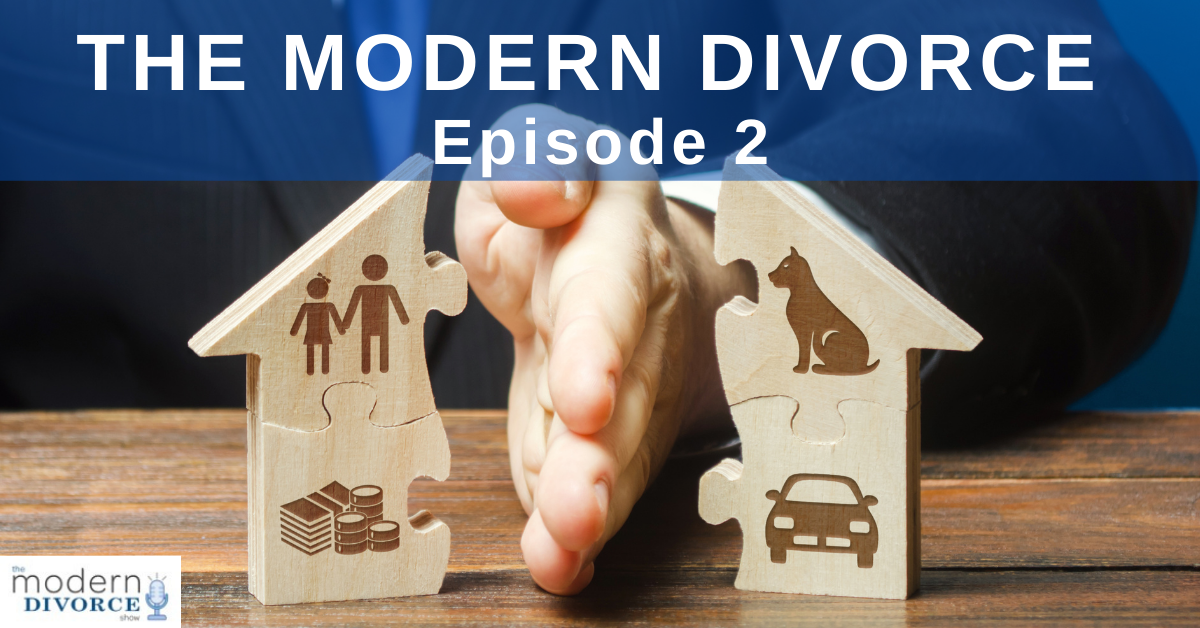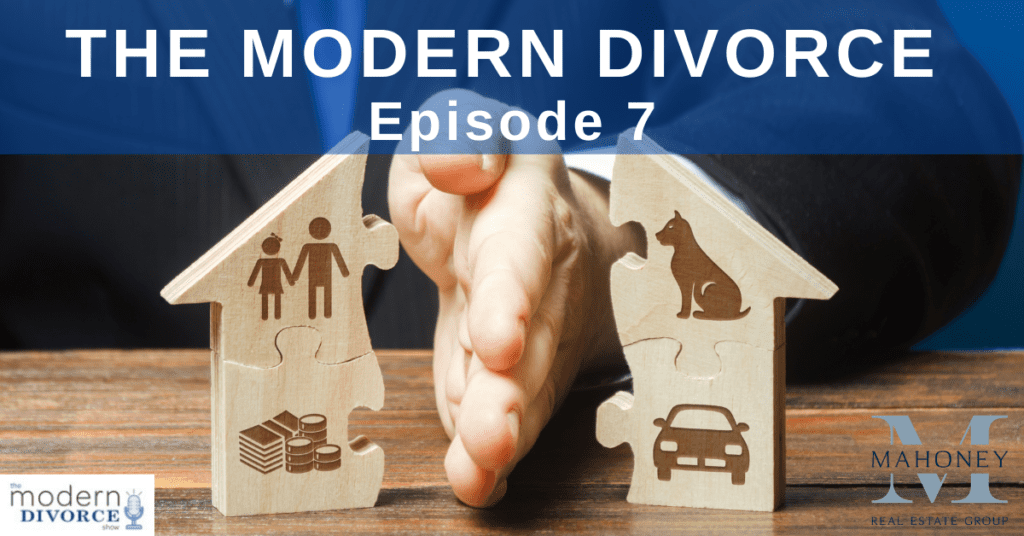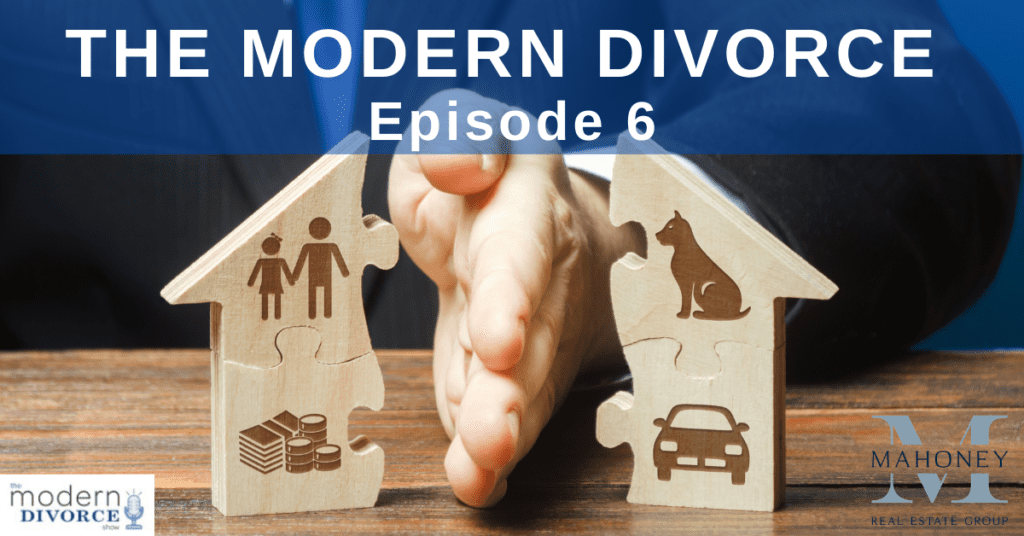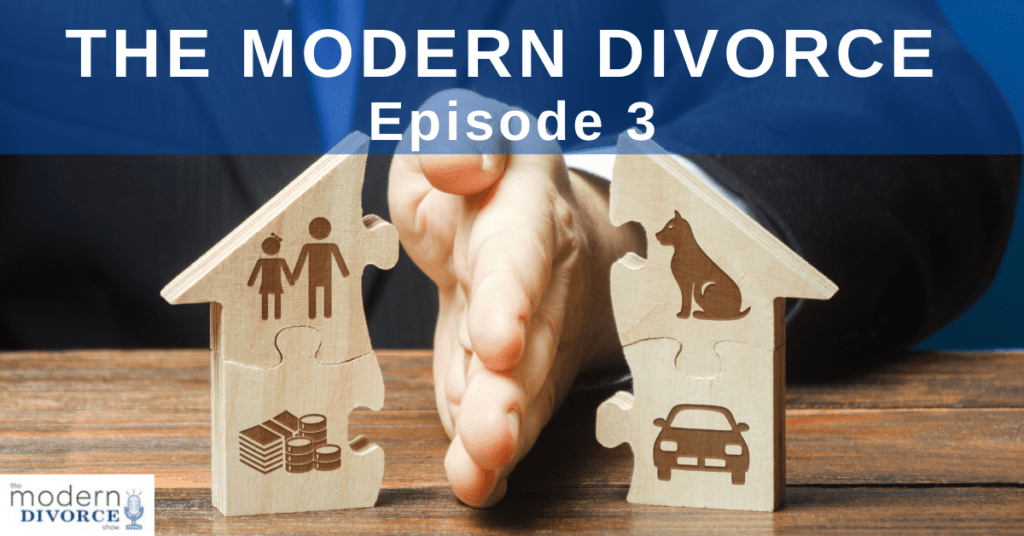ANNOUNCER (Intro): This is the modern divorce show with Anna-Marie Musson. Featuring Steve Cassar and family lawyer Anna-Marie Musson.
Steve: Welcome back to another week of The Modern Divorce Show, where we are changing the conversation around divorce. Our goal each week is to tackle the difficult issues surrounding divorce. This is about informing you. This is about stimulating discussion around the latest advances in divorce resolution. We talked about the modern divorce process from finance and child psychology, to mortgages, pre-nups, asset division and even who gets the family pet. Yes, there is a law to cover.
Anna-Marie, you’re a seasoned court room litigator but now you’re focus is collaborative law. Why?
Anna-Marie: Well, collaborative divorce really offers people the potential for a much more peaceful resolution. It really spares them from that bitterness and the pain from that long drawn out court battle that really leaves a stranger making important family decisions about their wealth, their kids and even their future. And so, for me, the collaborative divorce process is really one that works best for families.
Steve: Collaborative law is definitely a modern approach to separation and divorce but there’s a lot of myths and misconceptions out there not only about the process, but how much it costs and if it works?
Anna-Marie: Absolutely. We always tell people inform yourself with as much information as possible and equip yourself with the facts so you can make good decisions for you and your families. Sadly, many people think that the only way you can get a divorce is through the traditional process which really focuses on going to court, they think this is the only way. But, in fact, that’s a myth and it’s not the case at all, and collaborative divorce is a way for families to work through these issues without going to court.
This week we are fortunate to be able to tap into the experience of Victoria Smith, she is a collaborative lawyer, mediator, trainer, and co-owner of Resolve Dispute Resolution with over 30 years of experience. Now, I ‘ve personally had the pleasure of working with Victoria and have immense respect for her work and really how she’s built this area of practice.
So, first off Victoria, thank you for being with us on The Modern Divorce Show.
Victoria: Thanks for inviting me Anna-Marie, I’m really thrilled to speak with you about this.
Anna-Marie: So, today we’re talking about dispelling the myths around collaborative divorce, and this first myth I would say is one of the most common one I hear and in fact I heard it twice this weekend alone.
Victoria: (laughs)
Anna-Marie: And that’s this idea of “Isn’t collaborative divorce just a trendy new age process, it’s all bubbles and sunshine, and it’s never going to work for me because I have real issues to resolve”.
Victoria: Wow.
Anna-Marie: What do you say to people who think this is what collaborative divorce is?
Victoria: Yeah. I think it’s actually the very opposite of that Anna-Marie, and I think it is a process that is very structured, that is very proactive and organized. The professionals that are working in this process have to be specially trained in the collaborative process and effective negotiation and respectful negotiation. And it’s a process that follows a series of steps, although, we can customize them for our clients, what we know is that we’re going to start with saying once both parties have hired collaborative lawyers, we’re going to start by a first meeting in which we say “Okay, what are your overarching goals? Where are you right now? Are your interim arrangements okay?” I just got off the phone with somebody, I walked through this with her, so, now we’re going to have a meeting where you’re in the house, and he’s not in the house and then who’s doing what? Is that all okay while we negotiate? We planned for how we’re going to collect all the numbers we need. We jointly retained evaluation experts that we need. And if there are children, we usually work with a family professional to help with the parenting plan usually offline. So, we map out how we’re going to do this, at the end of every meeting as you know Anna-Marie, we send out an agenda, so everybody is ready for it and we prepare for it. And after a meeting we send out a note we call a progress note, with sort of summarizing what we did and what our homework is, and we really move forward in a very organized, efficient way.
If one of the things I think is really advantageous about collaborative, is it keeps our cost down and has people knowing what steps we’re taking to get their agreement reached.
Anna-Marie: Absolutely. I was going to say the structure is so critical to these cases and so people understand what’s coming up and what’s next in the process.
Victoria: Yes! 100%.
Anna-Marie: It really helps alleviate all of that worry and anxiety I’ve seen.
Victoria: It really does. And I find it in the traditional process, cause I did that for quite a long time, there’s very little of this proactive organization, it felt pretty reactive, and I think for folks to get more grounded and feel safer, It’s really helpful to have a road map in front of them.
Anna-Marie: And so, the second myth that I wanted to address with you and this is an interesting one because I actually got this request from last week from someone, who asked me to help them locate the meanest, nastiest lawyer they could find. And of course, the first thing I thought was, why would you need that kind of person for your family law case? And so, my question to you is, if I agree to collaborative divorce will I get trapped in a bad deal? I need a pitbull litigator if I want to get absolutely anything. That was what this woman was thinking, that was her mindset. Is this actually the case?
Victoria: Yeah. I often asked the same question Anna-Marie, when you’re asking that I go, “Why are you asking for that?” What’s underneath that? And I think it’s fear. I think that people that asks for this are afraid. They’re afraid that they’re going to take advantage of their partner. They’re afraid that their going to get bulldogs bite them or they can’t go toe-to-toe with them. Or they’re going to charm everybody or they’re going to throw in the towel because that’s been the pattern in their relationship. And so those are people who say I need somebody in my corner, I need somebody to help me negotiate.
And, I actually think that’s the reason people should consider collaborative over mediation. Because mediation means, as we know, that you’re going to work with a neutral person. So, people that choose collaborative, tend to be people who say “I want to stay out of the court but I need some help”. So, I think in the context of settlement work, Anna-Marie, we all know now 97% of every case is going to settle. What we’re really looking for is not a pit bull who is going to create expensiveness and make it much more difficult to negotiate, but a smart lawyer who can be strong, and who can help a client feel that they’re being represented wisely and well.
Anna-Marie: Absolutely. Another common myth that I wanted to chat with you about was this idea that you can’t successfully use collaborative divorce if you have conflict or high conflict. So, in other words, collaborative divorce works for people who get along but not for people who don’t get along.
Victoria: (laughs)
Anna-Marie: What do you say about that?
Victoria: You know, I always smile when I hear that because I think that if you’re getting along, if you trust each other, and if you’re communicating beautifully, you’re probably still married. And so. Some level of trust and/or lack of trust and lack of communication, and not getting along is the territory of everybody going through a divorce. This is the dynamics of everybody that we’re seeing. You know, you’re offering a process that’s safe, where we treat everybody with respect, where we let everybody speak and be heard, where we’re modeling that for our clients, we’re coaching our clients on how they can speak so their partner can hear them and to listen to their partner. And sometimes, we have our clients work with family professionals to teach all their kids to really be able to talk in a constructive way as they move forward.
Anna-Marie: That was Collaborative Family Lawyer Victoria Smith. She can be reached at resolvedr.com
Steve: Coming up on The Modern Divorce Show, we tackled some of the tough questions surrounding real-estate and mortgages during separations and divorce. We’re back in a moment.
|| Commercial ||
ANNOUNCER: Welcome back! This is the modern divorce show with Anna-Marie Musson. Featuring Steve Cassar and family lawyer Anna-Marie Musson.
Steve: Welcome back to The Modern Divorce Show.
Anna-Marie, we just heard you dispel a lot of myths surrounding the collaborative approach to divorce but, this must also apply to the very important real-estate issues couples face when getting a divorce.
Anna-Marie: Well, the reality is after the conversation about the children, I’d say it’s one of the biggest issues on the table. Real-estate, the family home, the family cottage, they’re security blankets for us. And in fact, one of the hardest steps for couples can be getting a mortgage after they split. And so, we have mortgage agent John Panagakos, whose the creator of Separation Mortgages and he’s here with us today.
John, what’s the top myth in the world of mortgages? Let me guess, this is one I hear all the time the most important thing to consider in the mortgage is the lowest rate.
John: Yeah, we get that question often and that myth and everything that surround low rates. I think one of the biggest myths is that everyone should be shopping around to the lowest. Right? Unfortunately, what’s going to happen is if you talk to 5 different professionals then you’re going to get 5 different answers. I would say, why don’t you maybe interview 1 or 2 maybe 3 different mortgage professionals and work with the person that your gut tells you is the most qualified and let him/her do the shopping on your behalf.
What a lot of people don’t realize is quite often that the lowest rates come with the most terminant conditions associated with that mortgage product and term. For example, just last week, we were on a file where two people are separating and divorcing and because they saved I think 6 or $8 a month, because they really have a good low rate, they’re actually not able to refinance the property to provide a buyout for the ex-husband with a new lending institution, so, they actually have to be able to qualify with the existing lender and they might have a difficult time. As a result, they now are subject to those rates because they have sale clots.
So, we have a saying in the business, “A low rate may save you hundreds of dollars but the right mortgage product will in actually thousands of dollars”. So, whoever you use, make sure that they disclose the terms at any mortgage in advance of you signing on the dotted line.
Anna-Marie: So, it’s really important to have a mortgage agent who understands and reads the fine print. I like that. John, you and I were speaking off-air and you told me that we can’t always rely on our home bank or our home branch for that matter, this surprised me a little bit. Is this another myth?
John: Not another myth, it’s pretty much reality and you know for the sake of clarity, I want to make sure that I’m not bank bashing cause I think that’s poor taste but you know, gone are the days that people actually walk into branches anymore and that the person that you had a relationship with at the branch still exist, still works there. You see, a lot of turnover of the branch and it’s really hard to get someone on the phone or to be able to help you especially when it comes to separation and divorce.
We often hear clients walk into the branch “May I speak to Mrs. Smith” and the answers that they receive once they hear “Hey, I’m separating and divorcing, can you help me?” is “Where’s your signed agreement? I can only move forward if you have a signed agreement”. That doesn’t work with separation mortgage financing when you need a divorce, it’s a horse-cart scenario. Clients need answers and they need answers to be able to go back to their lawyers or whoever to say “Yes, I can buyout my ex-husband” and I can give him say $300,000 and were able to satisfy this portion of the separation process.
There is a saying in the mortgage world “Going to your bank is like having monkeys watch over your bananas”. So, as we said earlier make sure that you have the right mortgage professional that’s going to provide the best solutions for you.
Anna-Marie: And once that have more than just the short terms solutions, I think that’s really important too. Okay, here’s one for all the play-it-safe people out there and just so you know I’m one of this play-it-safe people. Is the 5-year fixed mortgage really the safest bet?
John: It can be the safest bet, but it can also be the most detrimental rate. So, it’s important to understand that all mortgages have different terms and conditions associated with them. So, the big banks if you signed up for a 5 year fixed will have the highest mortgage penalties attached to that mortgage, whereas non-bank lenders, also known as the whole sale lenders who put most of their money from the big banks, their 5 year fixed penalties are amongst the lowest in the industry. So, there are often people who say that “You know what I’m loyal to my bank. I really want to get a bank mortgage. John can you please get a financing at the bank ABC”. I’d say “Sure, no problem. We can do that for you” Here the risk is associated with a 5-year fixed and I understand that you want to stay there, no problem. Let’s maybe cut a 4-year fixed or a 5-year variable, what happens here is that your risk exposure decreases substantially by decreasing the term. And this is Mortgage Planning 101.
Now, we’re able to fulfill the requirement or the request of the client and we’re able to provide them with the bank that they want but we’re also be able to provide them with a secure mortgage.
Anna-Marie: We’re speaking with the mortgage agent John Panagakos, the creator of Separation Mortgages.
John, this show really tries to help people facing separation and divorce. And you are collaboratively trained. Can you tell us a bit about that and how that helps you help people in the mortgage world?
John: You’re right, I am collaboratively trained. I’m probably one of maybe 5 mortgage brokers across Canada who are collaboratively trained and so it allows me to understand the process of what people go through. So, you know, people have their meetings or their meetings with financial neutrals and I’m able to provide insight, I’m able to complement that process by understanding “Hey, you know what these are difficult times”. And able to provide more of an empathetic ear and a better approach because I understand the process that they’re going through.
Anna-Marie: Thank you John! We look forward to hearing more from you next week. John, where can people get in touch with you?
John: Best way to get in touch with me is through my website SeparationMortgages.com.
Anna-Marie: Thank you.
Steve: We all know real-estate is one of the hot topics these days and there are myths that are leading people in the wrong direction. Helping us navigate the complex and changing world of real-estate is Veteran Agent Sean Mahoney, principal of the Mahoney Real Estate Group.
Anna-Marie: Welcome Sean! Thanks for joining us again this week.
Sean: Awesome. Thanks for having me. Great to be here.
Anna-Marie: So can you speak to us some of the biggest myths when it comes to real-estate.
Sean: I would say there are quite a few of them, one of them that comes to mind is that all realtors are the same. I would say the general process of buying and selling, it’s similar, but I ultimately know 2 agents aren’t the same and their approach aren’t the same. However, saying that the public kind of lumps as in as us being all the same, so there are differences in terms of approach, the presentation and even like achievements which going back actually to last episode. We talked about what to look for and one of the things I didn’t mention which I feel very important would be education training, credentials of the realtor, this can really be the difference between an average realtor and a great one and I genuinely believe that there’s a direct correlation towards the overall experience and satisfaction posed for their clients and working with other realtors.
What I find is if they are willing to invest in themselves, they’re definitely willing to invest in their clients. And their commitment, it definitely shines through when it most matters.
Anna-Marie: Yeah. I think you’re right when you talk a little bit about the background does matter, and the type of training and type of work that agents have done. I think it does matter. I think you are right on!
Sean: Definitely. Well, I mean, just quickly, I recently had a situation of a client where she found the perfect house and unfortunately so did another buyer. I recognized the importance of their professionalism, creating a positive first impression and we actually, ultimately won that house even though the other offer was firm, meaning no conditions, and we did have a financing condition. And I learned a lot of that through negotiation courses, and really what I came away with is most people’s motivation for money is much lower than we think, and you just have to get the seller or the buyer/seller to seal it, especially when you’re selling a home. So, there’s a lot of other things that come to it than just price.
Anna-Marie: Okay, what about multiple bids? Now, I’ve heard some agents used a formula when there are multiple bids to determine how high you should go above asking price. Is there some magic formula or is there some secret formula and is this really the best approach?
Sean: I don’t know if that was necessary. The best approach I think you have to be really careful when it comes to this type of approach and it can in certain situations be very misleading only because, you never really know what the other buyer or the agent’s motivation is. I really believe this is why it’s so important to work with an agent who truly understands not only your needs but also the current market conditions especially, because they’re changing so rapidly week-to-week.
I do typically find that these called magic solutions or formulas, I find them used by agents less experienced or newer agents reading the newspaper a lot. Which I find that, you know, they glorify the industry and make it so much more competitive although it is competitive than it is, and they’re generally are the ones that kind of come up with these out of the blue calculations. I recently heard an agent say that she’s putting a 30% bid over bid, for asking price now for every house, I think that’s pretty reckless because it’s impossible to figure out what the fixed dollar number is and there’s so many variables especially listing price, as there’s no consistent formula for that. It could really backfire.
Anna-Marie: So, as you know, on this show we’re changing the conversation around divorce. How do you handle a couple who maybe in the midst of a bitter divorce?
Sean: I think at the end of the day. What I and my team do, or what I suggest is taking yourself away from the personalization or trying to choose sides, I mean ultimately if it’s, the divorce is bitter, I can’t change that and inserting myself in those situations which I’ve seen ultimately makes it harder or more stressful, so it’s really just comes down to asking questions, really understanding the clients and ultimately just being a professional. So, making sure that whatever that they’d hire you to do, whether it sell their house, buy a house, rent a place, get an opinion of the property, whatever you do, don’t insert yourself into that and just be professional.
Anna-Marie: Thank you Sean! We’ll see you back here next week. Sean Mahoney is the principal at the Mahoney Real Estate Group.
Sean, where can people contact you?
Sean: You can catch me on LinkedIn under SeanMahoney. My website at EnjoyYourWealth.ca or feel free to give me a call at 647-444-6683. Thank you.
Anna-Marie: Thank you!
Steve: Coming up. More about the myths surrounding separation and divorce as The Modern Divorce Show continues.
|| Commercial ||
Steve: Welcome back! Well, we spent half an hour discussing myths surrounding divorce. Anna-Marie, I wonder if these myths actually prevent people from moving forward with separation or divorce, their lack of facts if you will.
Anna-Marie: Absolutely. And it often causes anxiety or even pain that people don’t need to endure. Everyone has heard of someone who knows someone, who knows someone, who lost everything in their divorce. Or someone who have their kids taken away from them. And family and friends who really do mean well, offer this information which really 99% of the time is not accurate. And I can tell you that people who followed this well-intentioned but inaccurate advice, they’re not going to get the results they’re looking for, and worse, they’re going to spend more time and money and suffer unnecessary stress. So, it’s really critical that people have all the facts.
Steve: Absolutely. And it’s especially hard to make sure people have all the facts when it comes to the collaborative process.
Anna-Marie: Absolutely. And that is why we’re here. We are here to help people, we’re passionate about helping people going through divorce and really that’s why I started this entire practice of collaborative divorce and why we’re doing what we’re doing.
Steve: Anyhow, let’s be clear here. It’s not an easy road for anyone involved.
Anna-Marie: Absolutely not. But it doesn’t have to be terrible either. And we don’t have to make it more difficult than it needs to be and that’s why we are here. Changing the conversation around divorce, providing real solutions for people that they can use.
Thanks for listening everyone! If you have any questions, please send them along. You can reach us at TheModernDIvorceShow.com.
ANNOUNCER ENDING.
Separating? Divorcing?
Before making a move, make sure you have knowledge on your side. Get the advice you need from an experienced real estate agent to ensure a fair and equitable distribution of real estate assets. Reach out to The Mahoney Real Estate Group today to stop stressing about your divorce and start enjoying your wealth!




